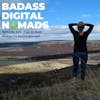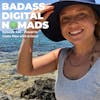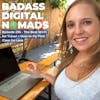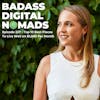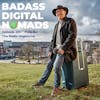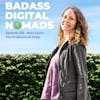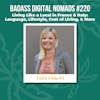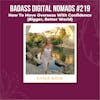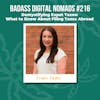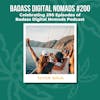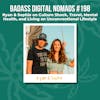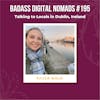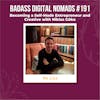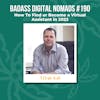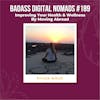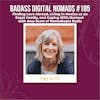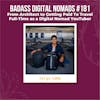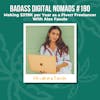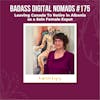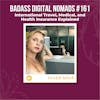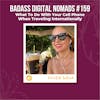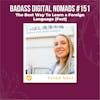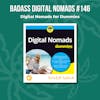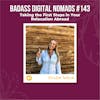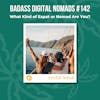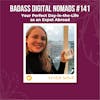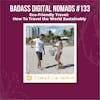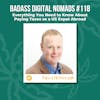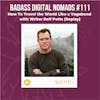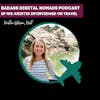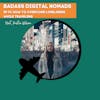What It's Like to Work Online and Travel with Remote Year
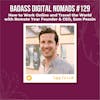
Feeling exhausted and uninspired at work? Maybe it's time for you to take a one-week, one-month, or one-year work-travel "workcation!" Meet Remote Year, a community-based work and travel company on a mission to help online professionals live and work from 30+ countries around the globe.
Feeling exhausted and uninspired at work? Maybe it's time for you to take a one-week, one-month, or one-year work-travel "workcation!"
Sam Pessin is the Co-Founder and CEO of Remote Year, a community-based work and travel company on a mission to help online professionals live and work from 30+ countries around the globe. Having grown up as a global citizen, traveling the world with his parents, Sam knows a thing or two about the power of experiencing new cultures and stepping outside your comfort zone.
In Episode 129 of Badass Digital Nomads, Kristin and Sam talk about everything Remote Year has to offer, from week-long retreats helping you recover from work-related burnout to year-long remote work and travel programs. You’ll gain insight into how Remote Year chooses the best locations for digital nomads, Sam’s favorite travel destinations around the world, and how he stays productive while running an international online business.
As Sam so wisely says, “People who are in more inspiring locations and enjoying their day-to-day life and weekends… will be more productive at work.”
Whether you're interested in a 1-week, 1-month, or 1-year remote work-travel program, Remote Year has options for you. Tune in to find out which experience is right for you!
Get a $100 marketplace credit when you join Remote Year through Badass Digital Nomads. (Note: You must use this link and fill out a referral form upon arrival to qualify for the credit.)
EPISODE 129 TOPICS DISCUSSED:
- Remote Year Retreats: Escape work life for a week with their workless travel programs. [1:52]
- The inspiration behind Remote Year. [6:24]
- What it’s like to grow up in several different countries. [12:07]
- Common concerns and hesitations people have when considering a remote work and travel lifestyle. [17:13]
- How to get approval from your boss to work while traveling & How Remote Year can help. [19:13]
- Use corporate retreats as a way for your company to reconnect, build culture, and build strategies with your employees. [22:28]
- How Remote Year chooses ideal travel destinations for remote workers. [30:39]
- Cities and countries you can travel to with Remote Year. [33:11]
- Combatting the expat bubble + the power of getting out of your comfort zone with other digital nomads. [33:57]
- The impact of the COVID-19 pandemic on Remote Year and other travel companies. [40:59]
- Tips for staying organized, focused, and productive as an online business owner. [46:32]
QUESTIONS ANSWERED:
- What is Remote Year? [1:00]
- What’s a typical day in the life on a retreat compared to a work program? [5:05]
- What countries have you lived in and how has that changed your global perspective and your lifestyle? [10:31/12:07]
- What is your earliest travel memory? [13:30]
- What types of people sign up for Remote Year programs? [15:47]
- Do coworkers, friends, or families often travel together in groups? [22:28]
- How do you get reliable internet and data connectivity abroad? [25:27]
- Do you work with locals of the countries you travel to? [38:41]
- And much more!
LIGHTNING ROUND:
- Favorite country for remote working.
- Favorite country for rest and relaxation.
- Most underrated destination.
- Tips for staying focused, organized, and productive while traveling.
- Favorite notes and productivity apps.
RESOURCES
Get a $100 Remote Year marketplace travel voucher when you join Remote Year through Badass Digital Nomads. (Note: You must use this link and fill out a referral form upon arrival to qualify for the credit.)
► Start your first side hustle with online freelancing: Use code QUITYOURJOB for $100 off Kristin's online course, Freelance to Freedom.
Related Videos:
- How I See the US After Living Abroad for 15 Years [CULTURE SHOCK]
- How to Get Paid $10k to Work From Home
- Digital Nomad Visas EXPLAINED: The Best (and Worst) Remote Work and Travel Permits
Related Podcasts:
- How to Travel the World Full-Time with Remote Year Founder, Greg Caplan
- Quitting Your Job to Start an Online Business with Mitko from That Remote Life
- How to Make Money Blogging on Medium with Tom Kuegler
Productivity Apps:
Sam’s Favorite Travel Destinations
- Sharm El Sheikh, Sinai Peninsula, Egypt
- Croatia
- Spain
- Ljubljana, Slovenia
Connect with Sam & Remote Year:
- Visit Remote Year’s Website (Mention Badass Digital Nomads for a free $100 travel voucher.)
- Follow Remote Year on Instagram
- Connect with Sam on LinkedIn
Connect with Kristin:
- Follow on Instagram
- Subscribe to Traveling with Kristin on YouTube
- Subscribe to Digital Nomad TV on YouTube
- Follow on Medium
- Follow on Clubhouse @KristinWilson
- Join the Badass Digital Nomads Facebook Group
- Search All Podcast Episodes on www.badassdigitalnomads.com
...........................................................................................
Special thank you this week to Dave Bowman who bought us 3 coffees!
Support the Badass Digital Nomads Podcast:
...........................................................................................
Thank you to our Traveling with Kristin/Badass Digital Nomads 2021 Patrons: Teklordz, Walt, Shawn, Richard Y, RZ, Craig S, Colin, Heather, Karen, Kiran, Scott, Michael and Annie, Issac, Mike M, Yasmine, Erick M, Yohji, Gary R , Ron, Gary, Ray, Henry L, Kelly, Alejandra, Keith, Stephen, Henry M, Warren, James, Daniel, Javier, Gary B, Emily, Rich, Aisha, Phil, Anthony, Anna, Jennifer, Kathleen, Natalie, Dave, Brian, Christopher, CJ, David, Mike, Kathleen, and Chip.
Special welcome to our newest Patrons from September/October 2021: Shelly, Paul, Ron, and Andy
❤️ Become a Patron for $5/month at Patreon.com/travelingwithkristin
...........................................................................................
Podcast descriptions may contain affiliate links of products and services we use and recommend at no additional cost to you.
Introduction: Welcome to Badass Digital Nomads, where we're pushing the boundaries of remote work and travel, all while staying grounded with a little bit of old school philosophy, self-development, and business advice from our guests.
Kristin Wilson, Host: 00:00:22 Hi everyone. Kristin Wilson from Traveling with Kristin here, and welcome to episode 129 of Badass Digital Nomads podcast. My guest today is Sam Pessin, the co-founder and CEO of Remote Year Company, which you may have heard about. It's a community based work travel company on a mission to help online professionals live and work from 30 plus countries around the globe. Now, Sam actually had a unique childhood because he grew up as an only child traveling around the world with his family because of his parents' jobs. But after coming back to the US to go to University of Michigan for his undergrad, he ended up entering the corporate world as you do, right? But soon after, Sam realized that this traditional nine to five lifestyle wasn't really his jam. And so Remote Year started back in 2014 when Sam and his co-founder asked a simple question, who wants to travel the world together for a year while working remotely?
Kristin: 00:01:32 After 25,000 people raised their hands, they knew they were on to something. And fast-forward to 2021 and Remote Year now offers a variety of one week retreats, as well as one, four and 12 month remote work immersion programs. You can sign up for Remote Year through the referral link in the show notes and support the podcast, plus get a $100 credit for their marketplace. Or you can also go to travelingwithKristin.com/RemoteYear for details. In this interview with Sam, you'll learn all about what Remote Year has to offer. I know there are a lot of options out there now for work travel retreats, and this is just one way of experiencing the remote work and travel lifestyle. So hopefully through this podcast, you'll be able to decide if Remote Year is a good fit for you, and you'll also learn about my thought process of why I considered joining Remote Year back in 2015 and what I ultimately decided to do. You'll also hear about some of his favorite destinations and how he stays productive on the road despite running this international remote company and with his family and new baby. Enjoy.
Podcast Interview:
Kristin: Well, welcome, Sam. So much to Badass Digital Nomads. It's so great to have you here. And where are you joining us from?
Sam Pessin: 00:03:07 Thank you so much for having me today. Uh, I'm joining from Washington, DC
Kristin: 00:03:11 Uh, yes, the exotic land of Washington DC <laugh>. Have you spent most of the pandemic there?
Sam: 00:03:18 Yes, uh, I was gonna say all of the pandemic, but I guess we have taken three or four trips, which I'm pretty proud of considering. We have an eight-month-old, so we're...
Kristin: 00:03:27 Oh Wow.
Sam: 00:03:27 Making progress, uh, in, uh, in getting out more.
Kristin: 00:03:31 This is the least I've traveled since I was 16 <laugh>, so it's definitely been a, been an adjustment. But it looks like you guys have a lot of exciting new trips coming out. I'm on your mailing list, so I'm getting plenty of FOMO by seeing all the Remote Year trips coming out. So we'll talk about those, um, a little bit toward the end of the interview. But what is Remote Year for people who have never heard of it?
Sam: 00:03:57 Remote Year is a community-based travel program for remote working professionals. Uh, we have a few different experiences and products within that, but ultimately we are building this already incredible group of remote working professionals that want to take their jobs and see the world and expand their horizons and, you know, have these amazing experiences with, uh, with their new group of friends on our program. So all of our programs start with community. You're with one group for the entire time. You can be traveling from anywhere from a week to a month to a year, uh, depending on which experience you sign up for. And yeah, it's, it's been an amazing journey to, to build these programs. And most recently we've launched retreats, which are the first programs we've ever had that are for people who are actually not working for a week. They're getting away for, you know, that short amount of time with, again, an a community and spending time more in, in nature and reconnecting and re-energizing themselves for, uh, for going back to work.
Kristin: 00:05:05 Oh, that's very exciting. Like a mini sabbatical.
Sam: 00:05:09 Well, the, I would say our work and travel programs are potentially an alternative to sabbatical. They're pretty similar in length one month to four months, uh, for example. But these people are working while they travel. They're not actually taking time off of work. The retreat programs are actually time off of work, but they're also only a week. So it's probably more like a vacation than a sabbatical in that sense.
Kristin: 00:05:33 Yeah, that's true. I guess you could, you can get a few different weeks and put them together.
Sam: 00:05:39 That would be a, an epic retreat.
Kristin: 00:05:42 <laugh>, I need to plan a vacation for myself. I think that's something that happens when you, when you work for yourself, especially when you're remote, is that you just kind of, every day is the same. I think a lot of people can relate to that, that now that they've been through the pandemic, but it's like you could end up taking off on a Wednesday and working on a Saturday or a Sunday, even like holidays. Like you might not observe the holiday in the country that you're in, but then you might not even observe your own country's holidays because you're living abroad. So time has no meaning after a while. But it is really important for definitely corporate employees, but also any solopreneurs or freelancers out there to, uh, remember to do some self-care and have fun and take vacations and plan them in. I did that for the first time, I think two years ago we started doing an annual leave at my company where we would just close for two weeks and everyone went on vacation. So that's always fun.
Sam: 00:06:40 That sounds amazing.
Kristin: 00:06:41 <laugh>. Yes. You'll probably need it too. Um, I I am sure after having a baby you need extra rest.
Sam: 00:06:47 Yeah, I think, I mean, remote is interesting because I believe that people who are in more inspiring locations and, and enjoying their day-to-day life and weekends and, and things like that, they'll be more productive at work. Like you said, I think when, when you're working at home, especially during Covid for the last year and a half, it's, it just gets hard. It gets very repetitive, time and work and pleasure and everything else just sort of blends together. And I think Remote Year can actually do a pretty good job of helping people compartmentalize that a little bit more, uh, have a little bit better work-life balance, be productive during the hours that they are working and then, you know, have the adventures of a lifetime when they're not.
Kristin: 00:07:27 Yeah, we, we, humans are, are weird because we're creatures of habit, but then we also need to mix it up so that we can stay inspired and stay motivated and, and stay productive. What are the differences between, let's say, like a typical day in the life of somebody who's on one of your one-month programs or your one-year programs versus the daily itinerary or activities of someone who's on one of the retreats
Sam: 00:07:58 Totally different. Uh, could like, almost couldn't be more different. I think I would think about the work and travel programs the one month, four month, 12 month, more like what your current life is probably like, but in a different country, you know, we very much respect the work week, so we try not to have too much going on day to day, especially during weekdays when you're on the program because most people are working in the coworking space or their apartments or a café for most of the day, and we don't wanna encourage people to not be working, of course. So we, we do most of the programming on the weekends, and in that sense it's very different than, uh, you know, a typical travel program or tour package where every hour of every day you have something scheduled. Um, retreats on the o other hand are much more like that. They're short, short duration, high intensity in terms of the, the programming and really intended to sort of help people connect on a deeper level and open up a little bit more.
Kristin: 00:08:55 And then you and your friend Greg founded Remote Year together almost by accident it seems, um, quite a few years ago now. And so you guys came from a corporate background. Can you bring us back to that discussion or that decision that you had and, and what was the inspiration for creating something like this, especially not having had any experience, uh, with doing that?
Sam: 00:09:23 Well, Greg came from a startup background, me less so <laugh>. I I came from maybe a bit more of a corporate background, but Greg had already started one or two businesses on his own and, and you know, he had this incredible idea to get a remote job and start traveling with his friends, uh, me being one of them. And, you know, he sat us down and asked us if we would all go travel with him, and we basically said no, because we didn't have remote jobs. And so, you know, he put up this website on Squarespace, and we were living in the same apartment together at the time, so I was obviously kind of like looking over his shoulder, seeing what was going on, and uh, and we started talking about it more and more. And, um, there was just this crazy reaction that we got to that initial website and initial concept to the point where there was so much interest in this program, just from people having submitted their email addresses that we decided to really chase this and, and try to make it a company, a program, a brand, um, and something that we could stand behind.
Sam: 00:10:25 Um, and for me personally, my background was very, very global. I grew up all over the place with my family, and I deeply believe that those types of experiences are really important for people to have, not just travel, but living abroad. And I think in most ways, Remote Year is much closer to living abroad than travel. You're, you know, you're working most days and living more like a local for long periods of time in each country. And the opportunity that, you know, Greg put in front of me to, to help him build that idea was perfectly aligned to what I believe in and gave me the opportunity to deliver that type of lifestyle to as many people as wanted to join it.
Kristin: 00:11:10 Yeah, that really resonated with me because I saw the initial website when it started going viral, way back when, and it, it definitely, um, my eyes and ears perked up because having lived abroad for so long and, and helping people move abroad, I knew how much work goes into it. And so I was so tempted to sign up just to have somebody to plan my travel for me and to, you know, coordinate the accommodations and things like that, which were all things that I was helping other people do. And so to me it looked like not only do you get a group of built-in friends, but you also have all the logistics covered, which was really appealing. And I, I ended up having to come back to the States for a little bit to help my family with some things, but I, I feel like I would've been right there with you at the very beginning.
Kristin: 00:12:03 And, and even the first time I ever moved abroad was 2002 when I studied abroad in Costa Rica as a rotary scholar. And after the first probably three days that I was there, I was completely sold and like hooked on the idea of living in a foreign country, even though those first couple days were a massive roller coaster. And by the end of my first semester abroad, and then I did a second semester in Australia, and I had this mindset that if everyone in the world were able to spend even one month living in another country, that it would just change everything. Like it would just change your whole perspective on life, change your whole worldview. And that's when I was 20 years old, and I just kind of never looked back. But what are some of the countries that you lived in before, and how do you think that changed your perspective on the world and like your lifestyle?
Sam: 00:13:01 So my family lived in a bunch of different places. I was growing up, um, my dad was a foreign correspondent for Voice of America, and we, when I was born, we lived in Beijing in China, and then when I was in elementary school, we moved to Israel to Jerusalem. And then in high school I lived in London. I mean, all of those experiences were just incredible. Also really challenging. I'm an only child and so, you know, reshaping and reforming your friend group and finding people to connect with is always hard when you, when you start over. And I think it's actually really healthy adversity to introduce to your life. Like it forces you to come a little bit out of your shell and adapt to new cultures and new people. And you know, even now that I have a kid, like I'm thinking about how can I give him that experience, uh, as early in life as I, as I can so that he has that level of healthy adversity and needs to start over and needs to make new friends. And, you know, there's other ways to do it, I guess by delaying the, the date that I get him a smartphone. But that's kind of a silly way to create adversity. So, you know, for me it's, it's, uh, it's important for my family and I think it's important for everyone around the world.
Kristin: 00:14:17 Do you remember your earliest travel memory?
Sam: 00:14:23 I think my earliest memory is we used to take trips to Egypt frequently when we were living in Jerusalem, and we went to the Sinai Peninsula to a place called Sharm El Sheikh many times when I was growing up. And we did one epic cruise down the Nile as well, when I was like seven or eight years old. And you know, there's, I just have these distinct images in my head of, of being in those places and being with our family friends and, and with my parents, you, you just, you know, you remember these, these pictures basically from, from those trips.
Kristin: 00:14:59 That's funny you mentioned that because I think my first travel memory was not even really traveling, but it was at Epcot Center in, um, Orlando, Florida. And they have, have you ever been there?
Sam: 00:15:13 I have not.
Kristin: 00:15:14 They basically have all the different country, not all the different countries, but a lot of different countries represented. So you can go to like China or Mexico, and then they have everything themed. They'll have buildings with the architecture, they'll have some sort of attraction or a ride or something there. And the one that I liked the most was Egypt and I must have been like four or five years old. And I remember learning about Egypt and this Disney, basically Disney World attraction. And my parents have a photo of me standing there with one of the, the women who was dressed up like an Egyptian. And after that I became obsessed with reading about Egypt and Egyptian history, and I even dressed up as Cleopatra for Halloween. I think I was five or six years old. And, um, I still to this day have not been to Egypt, but it's funny how those memories can be so formative. And that is, I think that's probably what sparked my desire to learn more about the world. But of course it's much a different when you're, when you're an adult. So the people that you have coming through the programs, is it mostly people who have traveled before or do you have a mix of people that are maybe getting a passport for the first time?
Sam: 00:16:35 It's a big mix. It's both of those things and everything in between. I think a lot of people who have a little bit less travel experience, like to use, you know, a community based experience as, as their first shot at that. And um, and we can be that for a lot of folks. You know, we had people all the way back to our first program that had barely ever traveled, and we also had people who had been, you know, full-time remote working and traveling around the world for years. And we're really just looking for a community, you know, it's, it's really nice to have that diversity of not just people and professions, but also of travel experience. You know, there's a lot of benefit I think that came from that in terms of, you know, the people who hadn't traveled as much, really, you know, bringing the energy and sort of everything that happened was just so meaningful to them. And, and that magic was felt I think, by the whole community, whereas the more experienced travelers really helping people understand how to be a responsible traveler and you know, how to get around in a new city and a new place. And, you know, there were just some sort of tips and tricks that I felt were really useful for everybody else.
Kristin: 00:17:40 What are some of the, the concerns or hesitations that people have before going like embarking on a 12-month trip around the world?
Sam: 00:17:51 I mean, for most people the, the main issue is, is their job, um, can they do it remotely and can they actually make this work professionally for themselves? Because if you're traveling for pleasure and, and just want to, you know, get away for a little while and not work and travel other than the retreats, remote use is probably not like a great fit for that use case. We are really developed for, for people who have remote jobs. So over the last many years that's been the, the main discussion we've been having with people who wanna join the program is, is this something you can actually do professionally or not? That has dramatically shifted in the last few months. So, you know, as obviously companies have meaningfully changed the way that they work and gone to full remote or hybrid or maybe they're gonna go back to the office, but they haven't yet.
Sam: 00:18:43 There's just been a lot more people who are joining our programs. Just to give an example, we, you know, before Covid about half of the people who did the program were full-time employees of a company. The other half were freelancers and entrepreneurs. Now that's about 70% full-time employees. Wow. So you, you know, the amount of interest and possibility for that group has, has just shifted a lot. There are huge companies that have announced and are still announcing their longer term remote and flexible plans and you know, we've just been here with similar programs that people can actually do now for the first time. So we've seen a really interesting uptake in that, especially for one month and four month, but also for the 12 month program. Um, there's a lot more people that can do that now.
Kristin: 00:19:33 How have you been appeasing the company's fears? Like let's say, uh, someone listening wants to do the program, but they don't think that they can get that approval from their superiors. Have you guys gotten involved at all with, with helping them make their case to the company that they can be productive and work while traveling? And then are you having any other kind of behind the scenes conversations with management teams about, you know, how this could work for their employees?
Sam: 00:20:07 Absolutely, and both of those things we always offer to help people speak to their company, their manager, their HR department. There's really two stakeholders typically at a company when thinking about a program like Remote Year. One is the manager or the CEO of that person that's more the strategic decision maker, do we want to allow our employees to do this? And then the other stakeholder is HR slash finance slash legal who usually have a bunch of questions around taxes and visas and employment stuff, right? So we usually have have discussions with both of those two groups, whether it's on behalf of a person who wants to join a program or when we're speaking directly to a company about partnering with us. I think where we've seen a lot of success is when companies are thinking about and investing in benefits programs for their employees such as sabbaticals or experiential rewards or anything like that.
Sam: 00:21:03 I think we fit really nicely into that with our four-month programs, especially for, for companies. And then with the more recent announcements around, you know, a lot of companies saying that employees can work one month per year abroad remotely and spend that time out of the country as a formal policy. That's a really interesting fit for our one month programs. People just do one per year, right? Rather than doing a 12-month program once in a lifetime, you sort of have this annual touchpoint with Remote Year. Some companies are interested in actually putting some dollars behind that and, and sponsoring or partially sponsoring these people to do the program. And others I think get plenty of value just by allowing this to be something that their employees can do.
Kristin: 00:21:47 Yeah, that would be a great perk if you could get like an expense account for your <laugh> remote travel. Um, well
Sam: 00:21:57 There all, there are budgets today already for learning and development, right? You know, employees of a lot of companies have these budgets annually that they can use toward learning and development or home office or like a bunch of different categories like that. And so, you know, I think Remote Year can fit into that for, for companies depending on how they, they define the rules and the policies around it.
Kristin: 00:22:19 And then I'm curious if you've had any like actual work groups come together? Like do you have coworkers that travel together or friends families?
Sam: 00:22:33 Yes, we have had a number of companies do either small groups on a existing program or we've even had a couple examples of companies that actually did a private trip or private itinerary for their, their company. We've had, you know, small handfuls of teams for example go on four month programs, and you know, there's sort of a mix of them being able to spend some time in person together, plus also some really great internal PR for the company as they report back on their experience and what they're seeing and what they're doing and how that's impacting their day-to-day job and what they think it means for the company. And then again, we've had a couple private groups in the past do dedicated experiences like a co-location for their whole team for a month or for a week in one place where they're working together, and you know, we handle all the logistics and they handle the content.
Sam: 00:23:26 Basically we're seeing more and more requests for stuff like that now. All companies are trying to find ways to reconnect with each other, with their, with their teams and corporate retreats are a huge way that, you know, they can do that. So we've been positioning our retreats programs as something that companies can actually invest in or purchase for their entire team or for a team within their team, depending on how big the company is to simply reconnect with each other and also do some creative work, build the strategy for the next six to 12 months. You know, these are the types of things that I do think are really valuable to do in person. So that's actually what we do as a team. We get together once or twice a year, actually sometimes even four times a year to build culture and build strategy and then we go off for three to six months and operate.
Kristin: 00:24:18 Yeah, I love that. Um, that's something I used to do before the pandemic is plan corporate retreats where people could get a villa in Portugal or Spain or Italy and work remotely there as a team, but it was under a different circumstances where it wasn't so widespread and it wasn't, um, in the context of the pandemic, it was more just for fun and team building, whereas now it's become a part of any company's remote first strategy to be able to connect with their employees and contractors in person, as you mentioned before, going back out into the world to do their jobs. I know a big concern that people have is always connectivity. So what are some of the ways that Remote Year helps people find wifi or stay connected, whether they're on like the one-month trip or the four-month trip, or if it's a corporation that's renting an entire property that needs, you know, they have 20 people online at the same time. Like, what are the kind of creative solutions you've found for that?
Sam: 00:25:29 They're not that creative, they just work. Uh, <laugh>, you know, connectivity is like oxygen when you're working remotely. It is the bottom rung of the hierarchy of needs for a remote worker is Wi-Fi and a roof over your head, right? And so we from the earliest days of Remote Year invested in making sure that that was up to our standards. You know, we learned a lot in the first year with the first program around Wi-Fi and cell connectivity through data and, and all the different ways we could sort of approach that as as a team. And you know, today there are few parts of that that we make sure are always working well. One is of course Wi-Fi in the coworking space. That's the best place to find really, really, really strong connection no matter what kind of work you're doing.
Kristin: 00:26:24 And didn't you guys buy your own coworking spaces?
Sam: 00:26:27 Uh, we didn't buy them. We, we did that, but we, we, we did, uh, furnish and build out, uh, a few of our own coworking spaces. It was not the, the normal procedure for us. We usually partnered with local brands, but we did build our own coworking space in a couple different places throughout that either didn't have coworking spaces but had everything else we were looking for or maybe didn't have a coworking space exactly where we needed it or within our budget or something like that. So we did build a couple times in that sense, but, you know, not only is the Wi-Fi strong, but we also make sure that it's accessible 24/7 because people are working different time zones. Some people work on the weekends and it needs to always be available to people as a reliable place to connect. The second thing that's really important is Wi-Fi in the apartments.
Sam: 00:27:15 A lot of people like to work at home even when they are on Remote Year. And so having a good connection at home is also a really important part of the puzzle. And then finally, we, since very early days of Remote Year, have offered a sim card plan where if you'd like our team to purchase a local sim card for your phone to be connected in each city, we have, you know, really great plans that are for 30 days basically and give you a lot of mobile data, and you know, we basically show up at the airport so you can pop it right on your phone the minute you land. A lot of people obviously do global plans with their providers, but for the people that want the strongest data on the ground as well as the, the cheapest price, they'll, they'll buy local sim cards, and we just facilitate that to be easy so that they don't have to, you know, go to a tell cell store and figure it out themselves.
Kristin: 00:28:07 Yeah, I do that for my clients too because it's a different in every country. I'm sure people end up with at least 12 sim cards by the end of that one year program. I have one on my desk from Norway that I don't, I should just throw it away. <laugh>
Sam: 00:28:22 I collected mine from our first program as well. I think I have them in a little, uh, box somewhere. <laugh>,
Kristin: 00:28:27 It's gotten a lot easier though in recent years. I can remember when I first moved to Costa Rica, you couldn't even get a cell phone unless you were a citizen or owned a company there. So the only way I could get a flip phone was through opening an offshore corporation, which I was doing for different reasons anyway. And then when I would go to Nicaragua, I'd have to cross the border and then take a taxi to this like a tell cell store. It was a different provider, though, I can't remember the name of it. And then go wait in line, like take a paper ticket and go wait in line and try to get, um, a prepaid card. And it didn't even have internet back then, it was just like, you know, phone calls and texting. But thankfully it's way better now. I think the situation we're in with being able to work from anywhere is something that, you know, would've been like in our wildest dreams even been like 20 years ago. So such an exciting time. But what are some of the things, you guys have a ton of, uh, locations now. I know you started with just that one year program that went to 12 different locations in a year, but how many countries are you in right now?
Sam: 00:29:40 We're getting near 20. It's mostly driven by the retreats. We've been expanding our footprint a little bit to introduce new, new retreat locations. And so that's, that's driven a lot of our, our global expansion, both cities within countries we already go to and also new countries.
Kristin: 00:29:58 One of the biggest things that, that people ask me and that I help people with is deciding where to go to start their journeys or even if they've already been traveling for a long time and they just wanna change it up, um, people are always asking me like, where should I go next? And now it's even more overwhelming with all of the digital nomad visas and remote work visas and things. So what are some of the things that you guys are looking for before you choose a destination? Like, how can a destination match up to your standards for what remote workers need?
Sam: 00:30:33 It starts with basics, you know, making sure that it's a place that we feel based on a couple different sources we use meet our safety requirements. Visa is important. Like is it really hard for most people for most countries to get into this place or is it pretty easy? You know, the harder it is from a Visa perspective, um, the more complicated it is and sometimes people have to go back in the middle of the program to, to get some of the visas in their home country. So we try to focus on countries that have favorable immigration policies. Cost is, is a big one. Not just for Remote Year, but also from a day-to-day perspective for people on the ground. And I'd say finally it's just the energy of the place, right? I think for our work and travel programs, we've typically focused on larger, I would say mid-size and larger cities a little bit less so, you know, remote beach destinations because we've learned that our community really does want a pretty vibrant community locally and a lot of stuff to do and activities going on and you know, cities really bring that to the forefront, whereas our retreats are in much more remote locations where you can really sort of escape and get away from it all.
Sam: 00:31:45 So it does depend a little bit on which program in terms of our criteria, but those are the main ones. And then from there we typically pilot a new city, so we'll do 2, 3, 4 different groups through that city, collect feedback, see if the feedback was really great or not so great. And then if it's not so great, you know, was it our fault in terms of how we structured things in that city or was it just something about the place that people didn't love?
Kristin: 00:32:11 Okay, that's good. So I'm just browsing, it looks like you have for the work and travel places from Croatia, a lot of places in Europe, South Africa. What are some of the more remote places for those retreats?
Sam: 00:32:26 So the retreats right now are in Miramar, Costa Rica, Lake Atitlán, Guatemala, and Guimarães, Portugal. And we actually are about to launch one in South Africa a couple hours from Cape Town. So you know, those are either usually in the mountains, on a river, on a lake, on a farm, and you know, places where people can just enjoy the space that they're in.
Kristin: 00:32:52 Nice. And then one of the things that the people that I know that have been on Remote Year, one of the things that they always talk about is the remote nation and just staying in touch with people and all the different alumni afterwards. So I wanted to ask you, a big thing that people talk about is you know, how to adapt to the places that they're going. And so there's kind of this tension between when you're a foreigner living abroad, um, you're getting out of your comfort zone, but then you also wanna quickly find a new comfort zone because you might be going by yourself, you don't know anybody. And so expats in digital nomads kind of tend to like go together because they could be foreigners from all different countries and they have that one thing in common that they're, you know, outsiders in a new country. But then that can be basically what we call the expat bubble, right? So how do you guys combat that tendency of like this like group comfort zone if you're on a one-month trip, for example. So you have people who are working part-time or full-time, they wanna get to know the people that they're living with, they wanna do some activities and sightseeing, but then they also wanna connect with the local community and not just kind of be tourists on their laptops. So how do you balance all of that?
Sam: 00:34:21 Yeah, it's a tough one. I I, you know, I think the truth is that the people who join our programs typically want that. And so it all starts there and if, if you want more exposure to the local community, you're gonna find a way to make that happen. We have a lot of different types of programming on Remote Year and, and some of those programs include members of the local community such as like social events or networking events where we really give people the opportunity to meet people from the local community. And a lot of our experiences are really designed to give a glimpse into life in that city or in a certain profession or of a certain nonprofit or something like that, in that country or in that city. So, you know, we absolutely, um, care a lot about being good travelers, responsible travelers, and also giving our remotes uh, an accurate flavor of what these places are like.
Sam: 00:35:11 You know, of course people do spend a lot of time with the people in their group, that is part of the experience, but we try to balance that with, with time, with the local community and, and also time with, with members from other communities that they connect with, like you said, through the remote nation. You know, we have a big slack group with about 3000 people from the nation that are constantly talking to each other about business, hobbies, meeting up in different places, physically going on trips together. And you know, every time someone pops into a new city, they'll usually jump into that city's channel and find other people that are there, so they can grab dinner and have some friends. It's quite a beautiful thing.
Kristin: 00:35:52 Yeah, that's nice to have that built in network. I feel like I have that now from the Nomad Cruise. Have you been on the Nomad Cruise?
Sam: 00:36:01 I have not.
Kristin: 00:36:02 You gotta check that. I don't know if they're still going to do it now, but before going on the Nomad Cruise, I wanted to go on Remote Year, but it didn't work out back in like 2015 I think it was. And then I went on Nomad Cruise in 2018. And so basically I was in this weird situation where I was either living abroad or I was in Nomad since like basically 2002 to 2005, but I didn't really know any other nomads. Like, I knew other expats that lived in the countries that I was in, but I was in Costa Rica for eight years. So it was really easy to get to know people after that much time, even though some of them would like come and go. But it wasn't until I went to an event and, you know, joined a group and started doing co-working and co-living in different countries that I felt like I created this network.
Kristin: 00:36:51 And my nomad network went from literally zero people to probably a thousand people in the first year. And so I can see how if you're in this community of 3000 people, and you all have this stuff in common, that it would be, um, definitely like a safety net. Any place you go is not so foreign because you know there's gonna be at least a handful of people that you can relate to on that level. And then when you're in the actual groups, are there locals from that country that are running them or working with the groups?
Sam: 00:37:24 For sure. We have, uh, local teams in every country that we operate in. And so when you arrive in a new place, you'll meet them, actually. You usually meet them before you arrive digitally on Zoom, and then of course they're basically waiting there at the airport for you when you arrive. Um, typically one or two people locally. And in addition to that, we have a program leader who spends the entire course of the program with your group, whether it be a week, a month or, or a year.
Kristin: 00:37:50 Okay, so you don't need any translators then? <laugh>
Sam: 00:37:54 <laugh>. Um, well it, it is an important component. Like we, you know, almost always find people who are born and raised in the city or at least the country to play that role. And it's just a huge part of the experience on the ground. When I talk to people after their program, the number one reason why people have positive things to say about Remote Year is, is their community. But the number two that I always hear is our staff. Hmm. Um, they just, they love their program leaders, they love the local teams and it just, it transforms their experience into something really incredible versus just traveling and working on your own, which can be not only challenging, but also just get less out of the actual day-to-day travel experience.
Kristin: 00:38:37 Yeah, I always think about that when I'm in a museum or something, and I'm just walking through versus if I get the audio tour versus if I actually hire a guide, then you always learn so much more. It's like the more you invest or the closer you get to the, the locals, then the more you learn from them. And I always like to eavesdrop if I'm just, let's say I'm in London and you know, the museums are free, so you just walk in, and I'll like hear another tour group, and I'm like, oh yeah, and I'll hear a story that I would've never heard if I weren't standing within earshot. So yeah, you always pick up these things that you don't expect in day-to-day life and culture from, from the locals. I, I would definitely agree with that. Um, and then I'm going to imagine that this past year and a half, at least at the beginning of the pandemic was probably a bit unnerving and stressful. Um, as the co-founder of a remote travel company, were you ever nervous at any point during the pandemic that your business could just go out of business or did you always think that things would come full circle and that this would push remote work and this lifestyle farther?
Sam: 00:39:53 Both <laugh>? Um, I mean I can't imagine anybody that was running a travel company of any size, uh, small, medium or large wasn't worried about going outta business last year. It was completely unclear how long people were not gonna be able to travel for or when they were able to travel where they were going to be able to go. It was really hard to make any decisions with such an unclear timeline and such an unclear environment to operate within. So yeah, we were definitely nervous about that, and we had to make some really tough decisions throughout that year to keep the company going and to set ourselves up to, to continue to operate in a post covid world. Really proud and thankful to to have that opportunity now. But um, but yeah, last year was, was very tough.
Kristin: 00:40:40 What are some of the biggest changes you've made that you wouldn't have done if the pandemic hadn't have happened?
Sam: 00:40:47 The short programs are, are a huge product evolution for us. We really tried to access more people with offering things like that, especially as we assumed more companies would, would not only be full-time remote but also be in a hybrid environment. And yeah, I think we've just been a little bit more careful with our costs, generally speaking.
Kristin: 00:41:06 Okay. Well for everyone listening, if you're interested in learning more about Remote Year, we'll drop a link in the show notes where you can use my referral link and you can even get a hundred dollars credit to the Remote Year marketplace. So make sure to check that out in the show notes. And Sam, are you ready for a quick lightning round?
Sam: 00:41:26 Let's do it.
Kristin: 00:41:27 Okay. So you are a remote work and travel expert, so give us your top list. What is your favorite destination personally for remote working and productivity?
Sam: 00:41:43 I hate to give you a a a lame answer here, but I, uh, the beauty of Remote Year is that we make that easy everywhere. And so I honestly can't pick a city just because we try to set up a great situation in all the places we've been, which is almost 40 at this point that I've been with Remote Year. So, um, that one's too tough for me. I think.
Kristin: 00:42:04 I know it's hard to pick a favorite, but everyone always asks me my favorite country, so I feel like I have to pass it on to all of my guests. How many countries have you been to total?
Sam: 00:42:14 I counted a long time ago and so, you know, I don't have a recent count. I think it's something like 70.
Kristin: 00:42:20 And then what about shutting off? So I know you have these retreats now, but is there any corner of the world that you like to go to for just rest and relaxation?
Sam: 00:42:32 I would say the slower paced places like Croatia, Spain, um, where the cultures are very work life focused and you know, really respect weekends and like to relax when they can
Kristin: 00:42:45 And like wine
Sam: 00:42:47 <laugh> and like wine. Although I think that might be true everywhere.
Kristin: 00:42:50 That's true <laugh>. And what is a location that um, that you went to that surprised you? Sometimes as travelers, even before we've been to a place, we have like this preconceived notion, maybe it's on our bucket list and we think it's gonna be our favorite place in the world or maybe it's somewhere we're not that excited about that once we get there it just blows our mind. Um, is there anywhere that was like that for you,
Sam: 00:43:18 Slovenia? Ah, we went to Slovenia with our first program, uh, on a little bit of a whim. We didn't know nearly enough about it like we did with most of our other places that we were going, that we've been personally or you know, new people in our network who gave us a bunch of advice. Slovenia was a little bit of a, a higher risk decision on our part and what a beautiful country. I mean, it is just, it's gorgeous there. The people are wonderful. There's Ljubljana is an amazing city. There's incredible nature in lakes. It just, I didn't have any real expectations going in and it and it, I fell in love pretty quickly.
Kristin: 00:43:55 Uh, that's been on my list forever. I've been all around it and even when I was sailing in Croatia, my skipper was from Slovenia and he was showing me, he's a photographer too and he was showing me pictures and I didn't even know they had a beach there. They have vineyards. And I since watched an episode of Chef's Table about a chef in Slovenia and it just looked completely stunning. So that's a great, uh, recommendation. And then having, uh, worked remotely for so long now and having, coming from a corporate background, what are are some of your tips for staying organized and focused and productive even while bouncing around all of these different countries?
Sam: 00:44:40 I'm a big list person, so I use uh, multiple lists systems for myself, but to be honest, like there's, there's no rocket science there. I think whatever works for people is fine for me. I use pretty common platforms for all this stuff. There's, you know, no, no tools I use that are way out of the ordinary and so it's just a matter of email, Slack and, and my lists and I, that's how I stay organized.
Kristin: 00:45:03 Which list app do you use?
Sam: 00:45:06 I use Evernote, um, although I don't love Evernote to be honest. So it is what I use and I'm uh, it's hard to move platforms so I'm feel a little stuck there.
Kristin: 00:45:16 There are high switching costs and I'm a list person too and I've dabbled in both digital and analog lists. I can tell you I felt the same way about Evernote and luckily I switched before I got too invested in it, but I've checked out Things for Mac, which I really like, but I have the problem of using too many list apps. I definitely use Apple Notes, I use Things, I think it's like a hundred bucks, but it's like the desktop version. So it's uh, just easier to see and check things off. And you can create templates. I use a lot of lists, well probably both of us do, 'cause we both do retreats, we both kind of do relocations and there's a lot of logistics that go into that, especially when you're running a company that does that for other people. So we must be list experts.
Kristin: 00:46:06 Um, but another one that I use, I have recommended a few times on the podcast is called WorkFlowy, which is your brain in a list format. And I think they have a free version and a paid version. It's like $29 a year and it really does work like your brain, like how you can have one thought and then connect it to another thought and then you can, you start with nothing, it's like a blank slate and then you can create bullets that are expandable. I should have workflow, you sponsor this podcast 'cause I've been using them for years. <laugh>. Um, and then you can search your notes and they have the, the iPhone app. So check that one out too. If you're in the market I'll for a new list app. Well those are all the questions I have for you today. Is there anything, uh, that you wanted to add or share with people who might be, uh, considering doing a work travel program for the first time and then where can people find out more information?
Sam: 00:47:01 I'm just excited that, uh, travel has started to resume. So if and when people feel ready for that, they just go on our website RemoteYear.com and should be clear from there what to do.
Kristin: 00:47:11 All right. Well thanks so much for your time, Sam. I hope that we get to, uh, enjoy a glass of wine in real life somewhere, sometime soon.
Sam: 00:47:21 And absolutely.
Kristin: 00:47:23 See you on the internet.
Sam: 00:47:24 Sounds good, Kristin. Thanks so much.
Kristin: 00:47:26 Bye everyone.
Kristin: 00:47:30 Kristin here. Thanks so much for listening. If you're interested in learning more about Remote Year, you can use our referral link in the show notes and get a $100 marketplace credit or head over to travelingwithKristin.com/RemoteYear for details and to search all 126 episodes of Badass Digital Nomads to leave a review or buy me a coffee, head on over to badassdigitalnomads.com. You can search by category topic and we even have a search bar so you can search anything you want and all the related podcasts will show up. Thanks so much for listening now. Get out there and seize the day and we'll see you again next week.
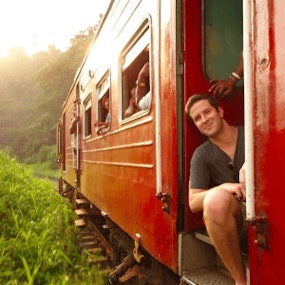
Sam Pessin
Co-Founder & President at Remote Year
After spending 3 years as a consultant at Bain & Company and a year as Head of Business Development at Vokal Interactive, Sam co-founded Remote Year - one of the world's first remote work and travel companies. When he's not out traveling the world, he lives in Washington, DC with his wife and new baby. He is also a graduate of the Ross School of Business at University of Michigan.


























